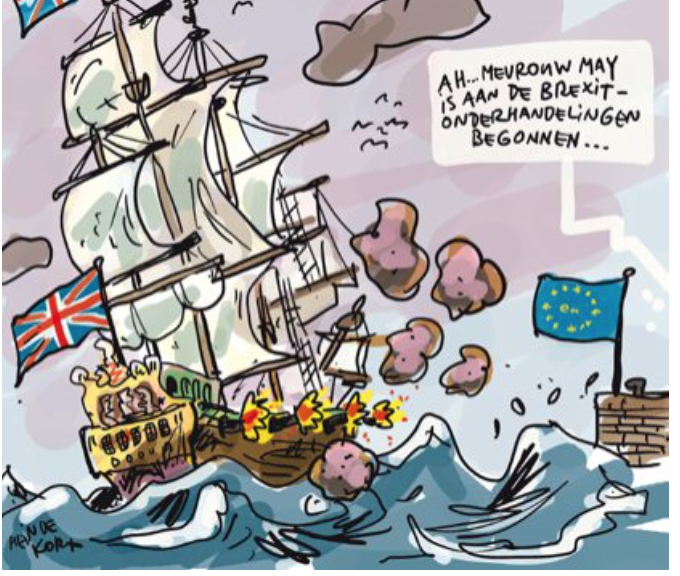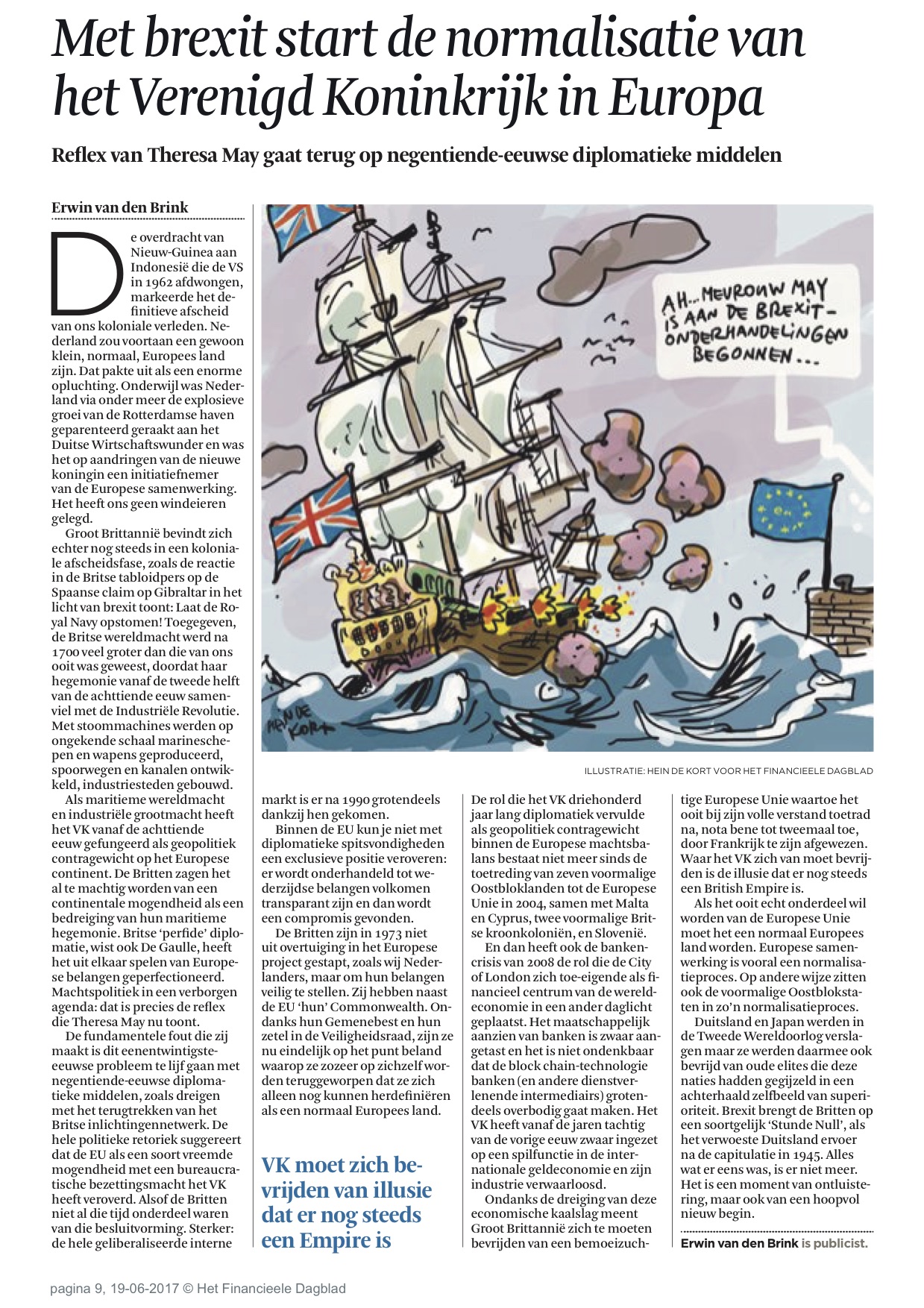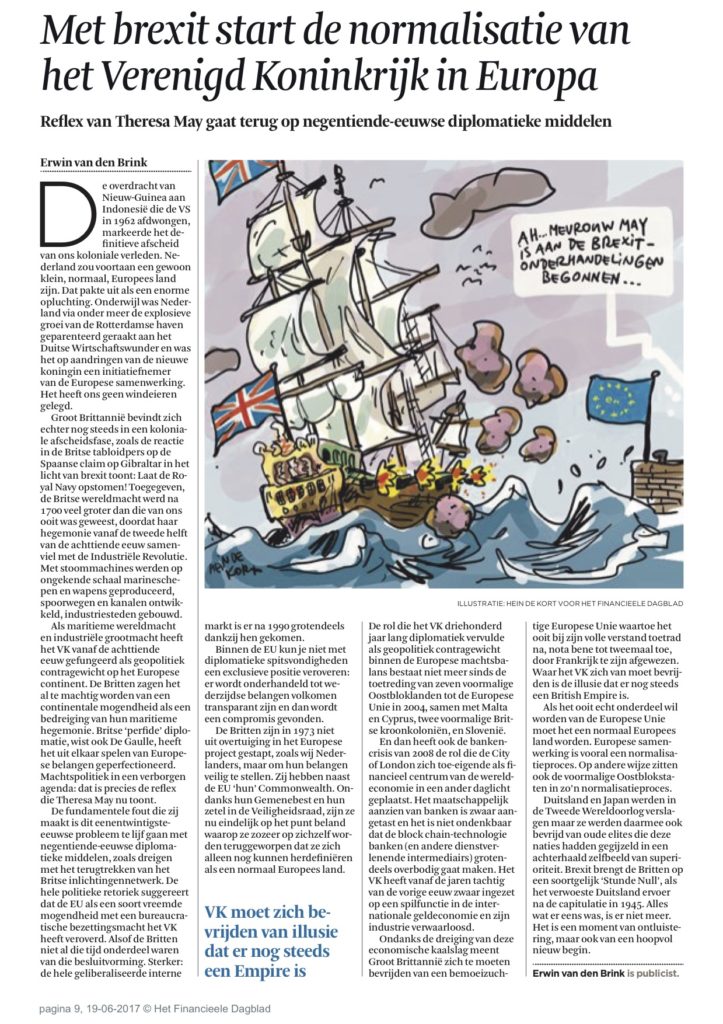The transfer of Dutch New Guinea to Indonesia enforced by the USA in 1962, marked the final farewell to our colonial past. The Netherlands would henceforth be a just small, normal, European country. However, that picked out as a huge, enormous, relief. In a way, in 1962 the USA liberated us for the second time. Meanwhile the Netherlands were through the explosive growth of the port of Rotterdam linked to the German Wirtschaftswunder and it was thanks to the efforts of the new queen Juliana that the Netherlands were also an initiator of the new European cooperation. That in particular has made our country thrive.
Great Britain, however, is still stuck in this colonial farewell phase as the reaction in the British tabloid press on the Spanish claim on Gibraltar in the light of brexit shows: let’s send the Royal Navy! Admittedly, the British world power after 1700 was much greater than that of the Dutch had ever been. This was because its hegemony from the second half of the eighteenth century coincided with the industrial revolution. With steam engines were on an unprecedented scale naval vessels and weapons produced, industrial cities built and railways and canals developed.
As a maritime world power and industrial power the UK has starting from the eighteenth century served as a geopolitical counterweight on the European continent. The British saw any too powerful continental power as a threat to their maritime hegemony. British ‘ perfidious ‘ diplomacy, so also knew De Gaulle, has perfected the play apart of European interests. Power politics in a hidden agenda: that is exactly the reflex that Theresa May now shows. The fundamental error she makes is to adress this twenty-first century brexitproblem with nineteenth century diplomatic means, such as threatening to withdraw the British intelligence services from European cooperation. The whole British political rhetoric suggests a EU being a sort of foreign power that conquered the UK with a bureaucratic occupational force. As if the British were not all that time part of that European decision making. In fact: the liberalized internal market as it emerged after 1990 has come about largely thanks to the British. The rules are these: In Europe you can’t conquer an exclusive position with diplomatic quibbles: there is seemingly endless negotiating until the mutual interests have become perfectly transparent and then finally parties find a compromise. This is not the weakness, but the strength of the European project.
The British did not out of conviction join the European project in 1973, such as Dutch did in 1950, but mainly to safeguard their interests. They have in addition to the EU ‘ their ‘ Commonwealth. Despite their Commonwealth and their seat on the Security Council, they are now finally on the point at which they are thrown back on their selves so much that they can redefine themselves only as a normal European country. The diplomacy role that the UK during three hundred years fulfilled as geopolitical counterweight within the European balance of power no longer exists since the accession of seven former Eastern bloc countries to the European Union in 2004, along with Malta and Cyprus, two former British Crown colonies, and Slovenia. And then also has the banking crisis of 2008 shed a different light on the role played by the City of London as a financial centre of the world economy. The social status of banks is heavily affected and it is not inconceivable that the block chain technology will make banks (and other service intermediaries) largely redundant. The UK has from the 1980s, heavily deployed on a pivotal role in the international money economy and has neglected its industry.
Despite the threat of these economic setbacks Great Britain believes it has to get rid of a meddlesome European Union which it joined in their right mind even after, on two occasions, it had been rejected by France. Where the UK should rid itself of is the illusion that there is still a British Empire. If it ever really wants to be part of the European Union again, or of Europe what so ever, then it must become a normal European country. European cooperation is especially a normalisation or standardisation process: compliance with a shared set of rules. Otherwise are also the former Eastern bloc States in such a standardisation process.
Germany and Japan were in the second world war defeated and experienced massive destruction but they were also freed from old elites who had taken hostage in these Nations an outdated self-image of superiority. And they rejoined the family of nations. Brexit brings the British in a way on a similar “Stunde Null”, as the devastated Germany experienced after the capitulation in 1945. Everything that once was, is no longer there. It is a moment of disillusionment, but also a hopeful new beginning.
Erwin van den Brink is a dutch journalist.



